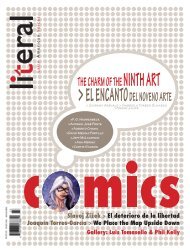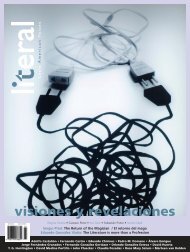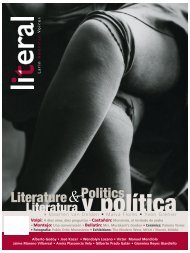Primo Jim Tanya Huntington Hyde - Literal
Primo Jim Tanya Huntington Hyde - Literal
Primo Jim Tanya Huntington Hyde - Literal
Create successful ePaper yourself
Turn your PDF publications into a flip-book with our unique Google optimized e-Paper software.
One of the<br />
reasons it is<br />
so diffi cult to<br />
break addictive<br />
patterns is that<br />
we are treating<br />
the refl exive<br />
behavior rather<br />
than the “idea”<br />
it was formed<br />
to treat.<br />
What else are New Year’s resolutions for but to<br />
set off valiantly to address the problems of which we<br />
are so keenly aware, and why are we so likely to fail<br />
in our resolve. One of the reasons it is so diffi cult to<br />
break addictive patterns is that we are treating the refl<br />
exive behavior rather than the “idea” it was formed to<br />
treat. Since our management systems wrap themselves<br />
around our core anxieties—fear of loss of autonomy,<br />
fear of the magnitude of our journey, fear of abandonment<br />
and the like—we never get to the real issue. If<br />
ever one is to address an addiction, one has to fi nally<br />
address the unbidden ideas to which our psyches, and<br />
therefore our addictive strategies, are in service. These<br />
“ideas” are not shameful although the consequences of<br />
some of our management systems often produce shaming<br />
consequences for us and for those around us.<br />
The usual treatment plan for any addiction is a<br />
summons to an heroic will. The heroic will is certainly<br />
a great asset and few of us would accomplish anything<br />
in life without it. But the heroic will is often trumped<br />
by the depth, ubiquity, and energy of those intrusive<br />
ideas. Thus, most of us fail to diet suffi ciently over long<br />
enough time because our will is subverted by an inner<br />
urgency. Or we fail to begin what we believe we should<br />
do, or fail to stop doing what has proved detrimental to<br />
ourselves or others. Clearly, heroic will can only make<br />
certain headway for us, which is why dieting centers<br />
and fad diets are so profi table for the owners, and why<br />
Twelve Step groups are so ubiquitous. (By the way, I am<br />
very much in support of Twelve Step programs as they<br />
have proved more effi cacious than most alternatives<br />
through the last seventy years).<br />
If ever one is to triumph over an addiction, one is<br />
fi rst summoned to feel more consciously what one has<br />
already been feeling, suffer what seems insufferable,<br />
and live through this experience without the refl exive<br />
management system. We never “solve” those unbidden<br />
ideas because they are an intimate part of our common<br />
human condition. We are born into perilous states and<br />
end by dying, so have a nice day! The question remains,<br />
however, to what degree is our life governed by these<br />
fears, and to what degree do our management systems<br />
own us, manage us, and with what troubling consequences.<br />
How many of us are able to bring the core fears and<br />
anxieties into consciousness, to see and acknowledge<br />
what they are truly about, and how many of us are able<br />
to go through those fears without the treatment plan<br />
we cobbled together.<br />
Not only do addictions bring harmful consequences<br />
to our lives, they also narrow them as one gets obses-<br />
34 4 LITERAL. LATIN AMERICAN VOICES FALL, 2008<br />
sional about our obsessional treatment plans for our<br />
obsessions. These unbidden ideas are obsessions, for<br />
they impose themselves upon us and cause distress, and<br />
compulsions as we are driven to behaviors dedicated to<br />
their prospective amelioration. But our thoughts, behaviors,<br />
lives, get oriented around these intrusive ideas and<br />
therefore narrowed. As Jungian Analyst Marion Woodman<br />
wrote, “Compulsions narrow life down until there<br />
is no living—existence perhaps, but no living.” In Greek<br />
mythology Ixion is tied to a wheel which turns continuously<br />
in the underworld. Addictions oblige us to venture<br />
into our personal underworld wherein we experience<br />
the same old, same old, as noted by the character of<br />
Satan in Paradise Lost at the beginning of this piece.<br />
As Gregory Bateson observed, the obsessional drinker<br />
believes he or she can challenge the “spirits.” The game<br />
is on, and more often the “spirits” win, so the drinker is<br />
imprisoned by that which he fi rst sought.<br />
This hidden spiritual desire, this need for transcendent<br />
“connection,” for “getting high,” was identifi ed<br />
in a letter exchange between Carl Jung and Bill W. who<br />
founded A. A. Jung suggested to Bill W. that Twelve<br />
Step programs acknowledge the profound role of our<br />
spiritual hunger, our spiritual thirst. Unless the person<br />
can differentiate that quite legitimate, necessary motive<br />
from the substance upon which he or she has projected,<br />
one will remain its bewitched captive.<br />
Freeing oneself from one’s addictive behaviors requires<br />
identifying what emotional reality or perception<br />
one is defending against through the addiction, and risk<br />
bearing what has been perceived as unbearable. Going<br />
through the fear, rather than defending against it is the<br />
only way we can stop Ixion’s wheel. It is no shame to fear<br />
abandonment, suffer boredom or depression. Until we<br />
can feel these things, really feel them, not anaesthetize<br />
them, we will remain unmotivated to change our lives.<br />
Piercing the veil, deconstructing the mechanics of<br />
the addictive cycle, identifying the primal, unassimilated<br />
idea for which our behaviors are a failing treatment plan<br />
is necessary. Then, as free persons, adults, we fi nd we<br />
can in fact bear the unbearable, think the unthinkable,<br />
suffer the insufferable, and be free.<br />
Dr. James Hollis, is a Jungian Analyst, Executive Director of Houston’s<br />
Jung Educational Center, and author, most recently of Why Good People<br />
Do Bad Things: Exploring Our Darker Selves.<br />
4 Para leer sin costo alguno la versión en español de este<br />
texto, escriba a: info@literalmagazine.com






